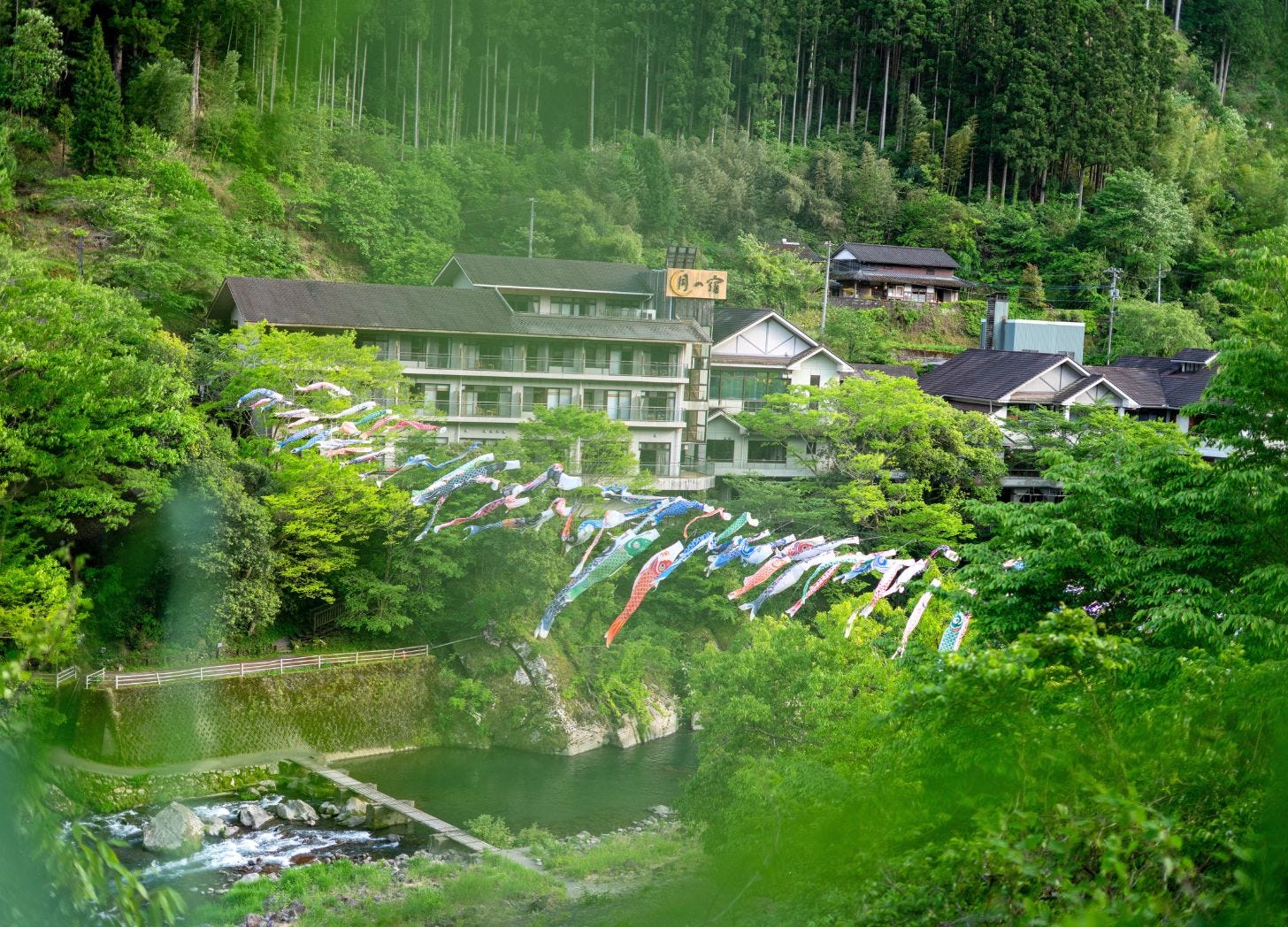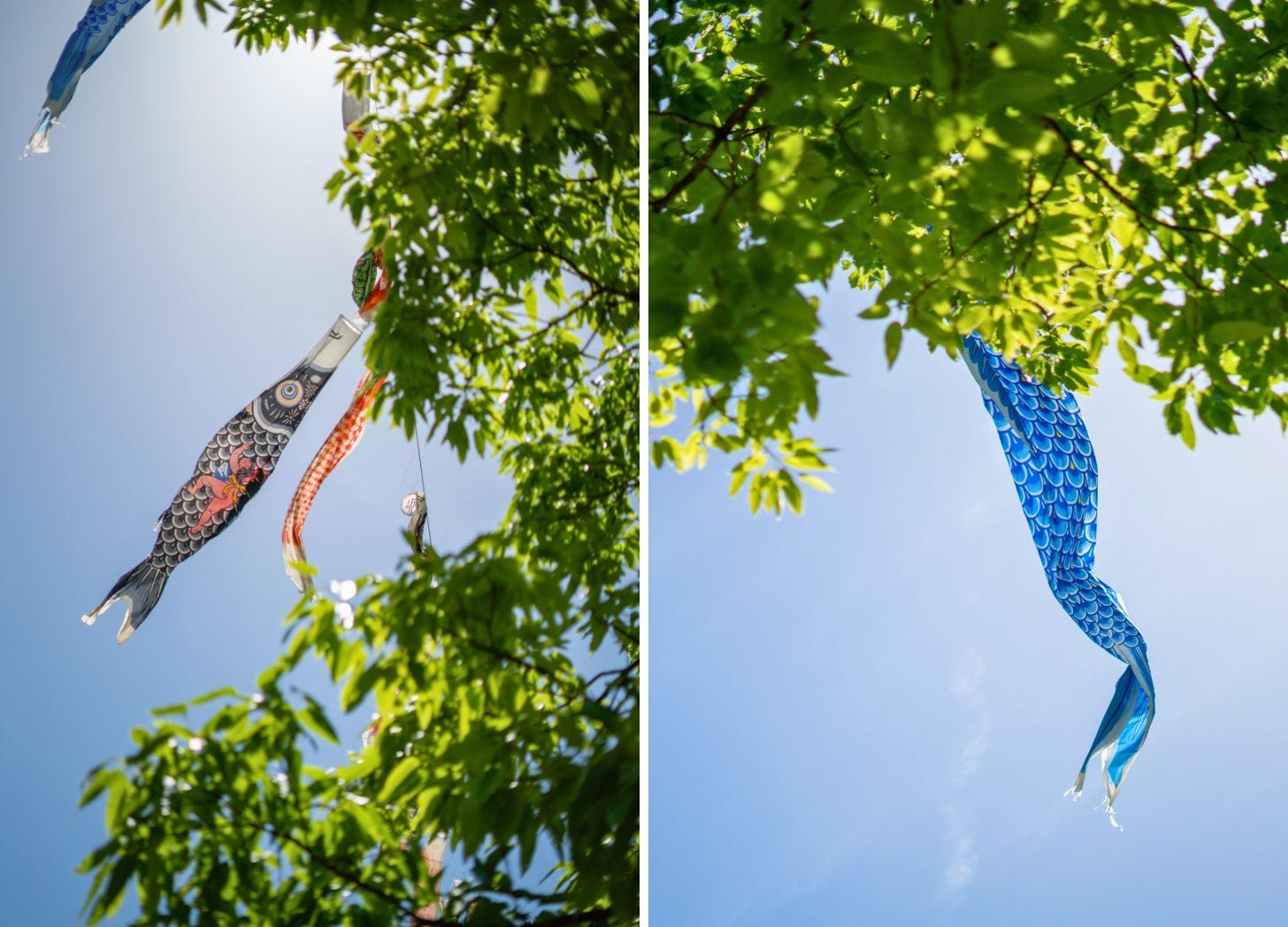Hello dear reader,
The rice paddies are now being filled with water, and when the surface stills, it reflects the sky like glass! It’s a breathtaking sight, and I feel deeply grateful for these days.
This week’s post is a little out of the ordinary — less nature and more musings on the recent mayoral election here in the village. I don’t often write about politics, not because I don’t think it’s incredibly important (Canada, my home country, just had a major election that had me gripped!), but because I gravitate to writing about what brings me joy, and that most often comes through observing nature and the cyclical patterns that shape our days and seasons.
That said… if you're curious, brace yourself for a longer newsletter. I hope you enjoy it, and as always, I welcome your thoughts and insights.
Wishing you a beautiful rest of the week,
Kana
One of my favourite times of year is when local volunteers gather to hang koi nobori (鯉のぼり), or carp streamers. About 200 koi nobori are tied to a thick wire rope and hung above the main river (Katsuura River) using a motorised pulley system.
Once the carp streamers are in place, the breeze glides through their hollow shape and the colourful koi look like they are swimming in the sky. If you look closely at the koi nobori fabric, you can notice intricate detailed patterns and prints of all colours. Koi nobori are flown for Children's Day (子供の日) on May 5th and they symbolize resilience, strength, and a wish for children to grow up healthy.
Not long ago, I asked readers if anyone would be interested in a piece about the recent mayoral election in Kamikatsu, and the positive responses were very encouraging! This mayoral election felt small (very small town), but also in a way big (in it’s significance?), but in what way I wasn’t really sure.
And then, watching the koi nobori fly in the wind, I realized in a town like Kamikatsu, the election isn’t only about electing a new leader, it reflects the deep tension running through much of rural Japan. In a way this election is a microcosm of how rural places are trying to honour traditions while responding to demographic and economic shifts that threaten their survival. In Kamikatsu, where over half the population is over 65 and births are few, there is inevitably a feeling of an uncertain future.
Don’t Talk About Politics
In Japan’s 2024 national general election, voter turnout fell to 53.85% (shockingly the third lowest post-war). Among young voters, turnout was estimated at around 43%. Various surveys suggest that young voters felt no party or candidate represented their views1. This decline in participation is a troubling trend that reflects a growing detachment from politics.
The lack of civic engagement was striking to me during the national elections. According to a study by the East Asia Institute2, Japanese citizens show a particularly low level of political interest compared to other developed democracies. In a survey conducted for the research, less than 5% of Japanese respondents specified a political party affiliation when asked which party they support, which is a huge contrast to the United States, where over 40% of respondents specified their political party affiliation. I’m also not necessarily saying that party affiliation is a good thing, rather this was a measure of the lack of affiliation at all with a set of political values.
It would be easy to dismiss this as apathy, but there are also cultural nuances that are at play — Japan is known for being a strongly top-down decision-making country, where once rules are created, they tend to be followed without much questioning. In an effort to maintain “peace” or neutrality, public discussion of political issues is often discouraged as young as elementary school and academics state that civic education is significantly lagging.
There’s a common saying in Japan that there are three things you shouldn’t talk about: politics, religion, and your favourite baseball team. Many Japanese people are reluctant to discuss topics that might disrupt wa (和) or a sense of (social) harmony, so political conversations can feel uncomfortable or even taboo. Interestingly, one survey found that people who had experience discussing politics at home were 20% more likely to vote than those who did not3.
Japan’s school system does not value critical thinking in the same way I understood its importance in my education; rather the national education emphasizes rote learning and the “correct answer” over debate or discussion.
Politics at the Village Level
In many parts of Japan, mayors now run uncontested — often because no one else is willing to step forward. In rural areas especially, the position of mayor is not as desirable as it once was. What was once a highly respected role now is seen by many people as a burden. Mayors are facing an existential crisis with villages on the verge of disappearing and being weighed down by shrinking budgets, limited resources, and rapidly ageing populations.
Against this backdrop of political apathy, Kamikatsu’s recent election can be considered an outlier. Kamikatsu had three candidates running for mayor and an 82% voter turnout!
Three Candidates, Three Different Visions
I won’t go too much into each candidate, but it was clear that all three candidates represented a different perspective and inherent set of unique values. All three candidates run as independents with no party apparatus behind them.
Hanamoto-san, the incumbent seeking his fourth term, campaigned on continuity. There was nothing “radical” in his perspective and most of the issues he felt were most pressing were the issues that seemed practical and addressed elderly people (the largest base of residents). He spoke of practical matters like fixing old water pipes, securing new farm equipment, and maintaining long-standing (albeit, questionably dwindling) projects he started over 15 years ago.
Tanaka-san, whose campaign slogan was “a new wind for Kamikatsu” focused on transparency (critical of current budget spending) and economic revitalization, especially through new industries like tourism and by improving the efficiency of farming and forestry through technology.
For being the oldest candidate, many of Tanaka-san’s ideas seemed to resonate more with ijuusha (移住者) or people who have moved to Kamikatsu from elsewhere. In Japanese, ijuusha often carries the strong implication of being an “outsider”. For all candidates, finding a balance between the perspectives of native and long-time residents and newer ijuusha is a challenge.
Then there was Sakai-san, a mushroom farmer with deep community roots. His message was all about collaboration and bottom-up change. It wasn’t clear how he would carry this approach out, but said that it was important that residents were the ones who would be a part of the change.
Balancing Act
In the lead-up to the election, Sil organized an event where residents could voice their concerns directly to all three candidates. While there was clear hesitation to speak up, there was also a quiet willingness because when it comes to local matters, everyone really does have an opinion. Still, it fell short of the lively discussion we had hoped for and that was a cultural reality check.
Democracy is built on inclusion but in an ageing society, I feel like younger people’s perspectives are at risk of being sidelined. I think it’s an oversimplified narrative to say that older voters are taking away the future from young people, but there is a clear generational imbalance where a normal pyramid distribution is flipped upside down in the village.
Kamikatsu is often celebrated for its pioneering environmental leadership, especially its ambitious Zero Waste initiatives launched over two decades ago. But these ideals, however inspiring, are also burdens for many — mostly older residents find the labour of sorting waste and participating in community initiatives are becoming harder.
But as someone who moved here because of these values, it was painful to realize that even the most “radical” candidate still campaigned within the limits of what that older electorate might find reasonable. Balancing future aspirations with present-day realities isn’t easy anywhere in the world, especially in a place that wants to lead by example without leaving anyone behind. How do we find that balance?
Speaker Phone Results
One of the true quirks of living here is that election results are broadcast over the town’s speaker system (the same one used for typhoon warnings and local announcements). On election night, April 13, the polls closed at 8:00 pm. At around 10:00 pm, people across town cracked open their windows waiting for the speaker phone results.
I felt that it was a close race so I was honestly unsure who would pull ahead. In the end, Hanamoto-san, the incumbent, won by only 21 votes over Tanaka-san. Not a landslide victory at all. And in fact, the majority of residents voted against Hanamoto-san. As an incumbent, it seems that his experience, and promise of stability and “no surprises” were ever so slightly a winning hand.
In a way, I secretly wanted this story to be about radical change — perhaps because, from my perspective, that kind of shift feels like it might be best for my future in the village. But then I wonder: is that selfish? After all, I share this town with so many others whose lives and challenges depend on a leader who can ease their concerns. I cherish, respect, and deeply admire the elderly people in my village so I’m trying to come to terms with what that means in the context of this election and concerns for the (/my) future.
Koi are the symbol of Children’s Day because they swim upstream against strong currents. Kamikatsu, like the koi, is doing the same by pushing against demographic declines and other headwind challenges. And perhaps what this rural election show is that democracy can still feel deeply engaging when the issues are close to home and the relationships (as messy as they may be…) connect people to their elected leader. Even if talking about politics in the open remains uncomfortable for many residents, an 82% voter turnout suggests we’re doing something right to make politics feel real and worth showing up for.
Thank you for reading! It’s funny how I can write 1,000 words about flowers without much effort, but gathering my thoughts for a piece like this required much more time than I initially anticipated. Thank you for your encouragement to write this!














Thank you for sharing your insights into this interesting aspect of how democracy works at a grassroots level roots level in rural Japan. It mirrors much of what I have observed over the years living in Japan - the tension between doing what the growing number of elderly want versus what is best for the dwindling next generations is something that’s hard to resolve. And that’s a big issue that the rest of the world is facing too.